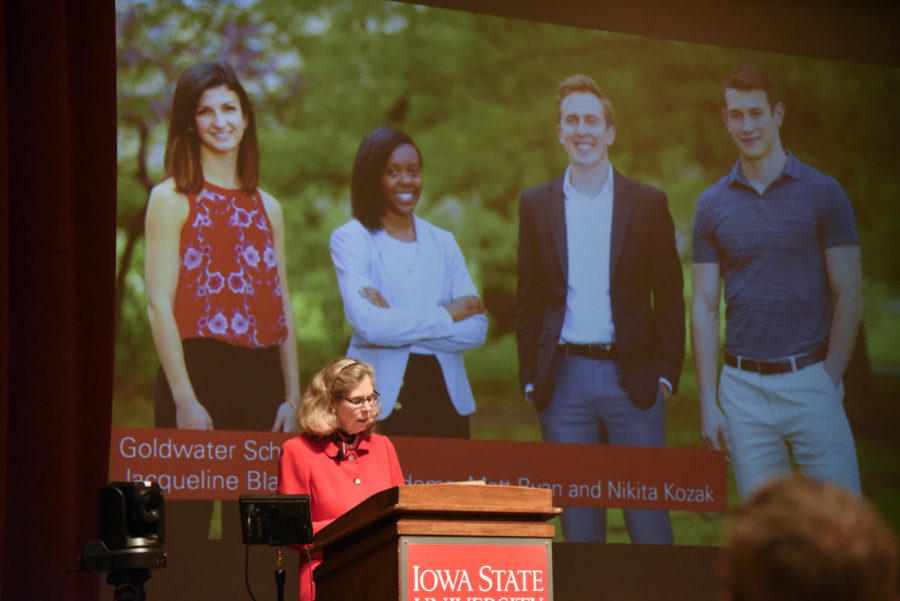Students to apply for national awards
Caitlin Yamada/ Iowa State Daily
President Wendy Wintersteen speaks about 2019 Goldwater Scholars Jacqueline Blaum, Atte Kadoma, Matthew Ryan and Nikita Kozak.
September 11, 2019
The fall campus deadlines for Nationally Competitive Awards are approaching. Iowa State provides information and guidance to prepare undergraduate and graduate students for these opportunities.
The awards available to Iowa State students are predominantly merit-based as the awards are focused on academic performance as well as leadership and service experience.
The three national scholarships that require campus nomination are The Barry Goldwater Scholarship and Excellence in Education Foundation, Harry S. Truman Scholarship and Udall Undergraduate Scholarship.
The deadlines for these applications are Oct. 21 (Goldwater), Nov. 4 (Truman) and Nov. 18 (Udall.)
The Barry Goldwater Scholarship and Excellence in Education Foundation is open to sophomores and juniors who are interested in research based careers and are currently participating in research within STEM fields.
All students at the junior level can apply for the Harry S. Truman Scholarship. The students who apply for this scholarship are looking at entering into a public service career.
The Udall Undergraduate Scholarship is available to sophomores and juniors. There are two categories, including an environmental category and one for Native American students.
During the State of the University address, President Wendy Wintersteen said Iowa State’s students continue to amaze the university with the honors they receive.
Wintersteen also said Iowa State is one of about 20 institutions, including Yale University and Stanford University, to have all four nominees selected as Goldwater scholars.
“This is the reflection on our great students; it is also a reflection about our faculty and staff and what they do inside and outside the classroom,” Wintersteen said
Laura Good, assistant director for Nationally Competitive Awards, said what makes applicants stand out is leadership, a passion for their field of study, community service and academic strength.
“For the scholarships that go through the campus process we have a faculty committee for each award that work in the area that the award emphasizes,” Good said.
Each committee meets to review the applications. After they select the campus nominees the nominees are paired with a faculty mentor and work with Good.
“Usually I see the candidates at least once every 10 days to touch base,” Good said. “And that’s through until when the national deadlines are, so usually the national deadlines are in late January or early February and so I’m working pretty closely with the candidates through November until February, really.”
The Center for Communication Excellence in the Graduate College has also hired a National Competitive Awards Writing Consultant, Kristin Terrill. Terrill meets with students who are developing their applications and help prepare them.
A helpful place to start for students is the awards directory on Iowa State’s University Honors Program website.
Students can scroll through the different categories on the directory, such as STEM-based, Public Service and Foreign Affairs and awards for multicultural students. Each award has specific websites that further explain the criteria and eligibility for the award.
The students interested in these awards can also schedule an appointment with Good where they can talk about what their options are and discuss the process of applying.
To schedule an appointment with Good, students can log into AccessPlus, click on the ‘Student tab’ and follow the directions for ‘ISU Appointments.’
Good also suggests possible candidates fill out and submit the Potential Fellowship Candidate Questionnaire, which helps her to understand each student and how she can most efficiently help them.
The process of applying for these awards takes time and a lot of effort. Good said it encourages students to think through what they care about and how to accomplish their goals.
“Even if you don’t end up as a recipient of the award, you learn so much about yourself and your writing skills develop,” Good said. “You come out of it with really clear goals and objectives for yourself.”







